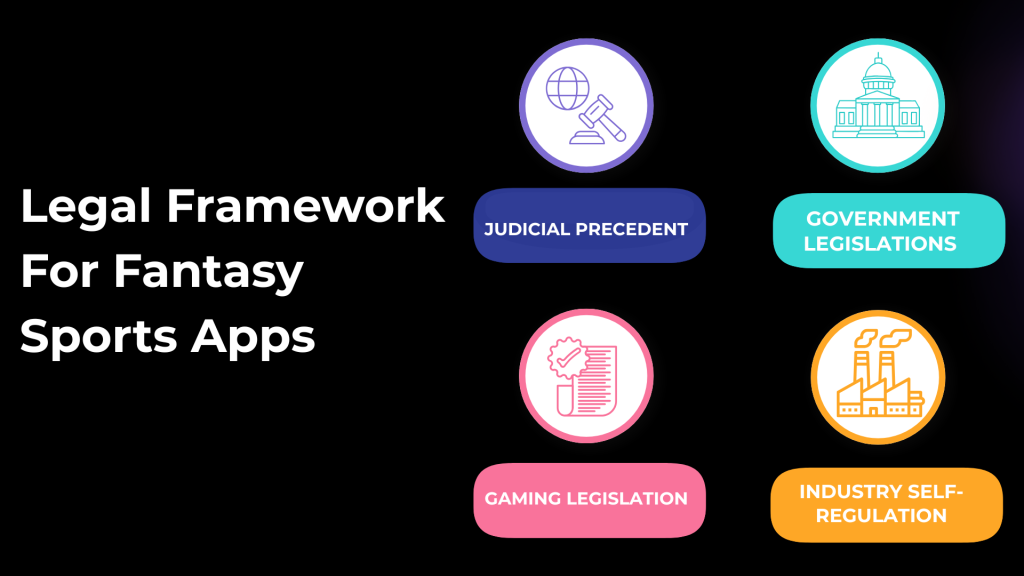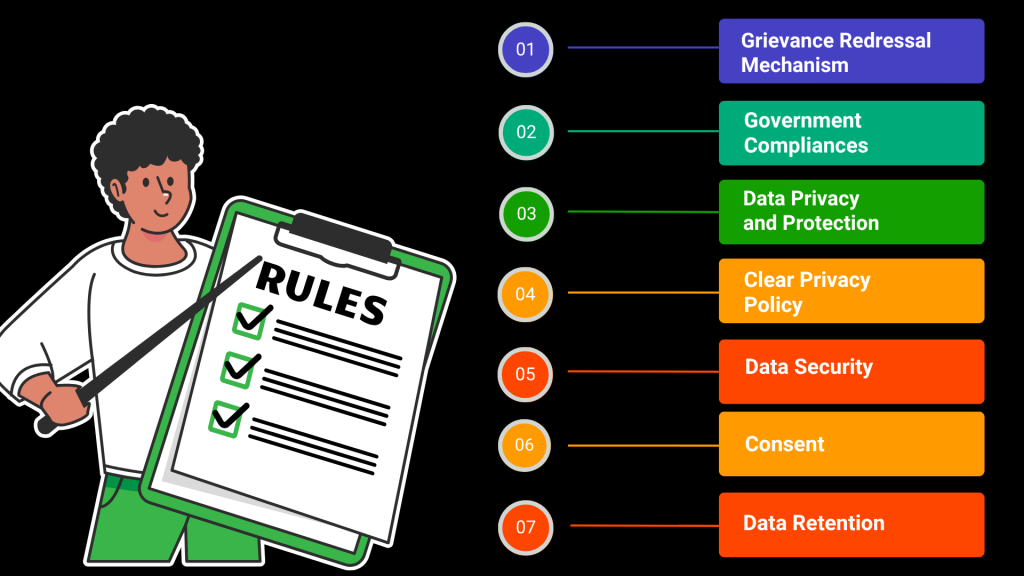
Summary: This blog tells you that India’s fantasy sports sector cannot flourish without “license.” It has to play within a web of intricate central laws (IT Act, Consumer Protection, 28% GST, 30% TDS, KYC/AML) and varying state gaming laws. Self-regulating organizations like FIFS and AIGF ought to play a significant role. Legal due diligence and collaboration with seasoned fantasy sports app developers are necessary for success. It requires developing compliant and secure platforms. |
The fast-paced fantasy sports industry has fascinated millions of people all around the world, changing the way fans interact with their loved sports. It’s a perfect mix of skill, strategy, and live thrill.
Fantasy sports apps are a major phenomenon in the world of digital entertainment. Aspiring entrepreneurs and developers who wish to join this field have one basic query in mind
What kind of license does a fantasy sports app need?
The legal environment for fantasy sports apps is no easy task. Unlike most other regulated markets, no one master fantasy sports license. It required blanket permission to operate nationwide. Rather, operators have to deal with a subtle interplay between central government directives, state laws, court precedents, and industry self-regulations.
This in-depth guide will analyse these complex layers, providing an exhaustive overview of the licensing requirements for fantasy sports apps. This will help you in grasping the essential legal and operational factors.
What Is a Fantasy Sports App?
A fantasy sports app is a digital platform where users create virtual teams composed of real-life athletes from upcoming matches or leagues. These users then compete against each other, and their teams earn points based on the actual statistical performance of their chosen players in real-world games.
For instance, in fantasy cricket or fantasy football, points might be awarded for runs scored, wickets taken, goals, assists, or tackles made. The user whose virtual team accumulates the highest points within a contest wins prizes, often real money.
According to reports by Precedence Research, the sports app market worldwide is worth USD 5.32 billion in 2025 and is expected to reach about USD 13.22 billion by 2034, growing at a compound annual growth rate (CAGR) of 10.64% during the forecast period, because of the global use of gamification and social integration.
In North America, the market size was more than USD 1.78 billion in 2024 and will grow at a CAGR of 10.79% by 2034. All market estimates and forecasts are provided based on revenue (USD Million/Billion), with 2024 as the base year.
We hope these reports will give you an interest in developing your app. If you need more questions answered, read the blog on how to develop a sports betting app to learn in detail.
The very essence of fantasy sports is its interactive and strategic appeal. It demands users to use their sports acumen, analytical minds, and research skills to choose players, allocate budgets, and take tactical decisions such as captain/vice-captain selection.
This focus on ability and mental activity is the determining factor for differentiating fantasy sports legally from other gambling activities in most jurisdictions, especially in India.
Pioneering sites such as Dream11, MyTeam11, and Mobile Premier League (MPL) are perfect examples of this model, with various sports and contest types presented to a huge user base.

Fantasy Sports License Overview
The idea of a single “fantasy sports license” in India is more of a myth. Rather, running a fantasy sports app legally is a multi-pronged strategy with a focus on regulatory compliance across a wide range of laws and regulations. There is no unified licensing system that awards a uniform permit to operate anywhere in the country.

In place of it, the legal framework for fantasy sports apps is influenced by:
Judicial precedents: Court decisions that classify fantasy sports as a “game of skill.”
Central government legislations: Acts such as the IT Act, consumer protection regulations, and tax laws.
Gaming legislations: These differ considerably, with some states allowing and others prohibiting or banning paid fantasy sports.
Industry self-regulation: Best practices and guidelines encouraged by industry associations.
Hence, obtaining the “correct type of license” is less about showing due care in keeping the law on one’s side and, in some states, getting specialized online gaming licenses. This elaborate scenario calls for intimate familiarity with Indian jurisprudence and active legal compliance for any fantasy sports operation to succeed.
To learn about legal compliance for a fantasy sports app, check our guide and understand legal compliance for developing a fantasy sports app in detail.
Legal Position in India - Chance vs. Skill
The essence of fantasy sports legality in India is the distinction between a “game of skill” and a “game of chance.” The basis for this difference is central because the Public Gambling Act of 1867, the key central law regulating gambling, prohibits games of chance but tends to exempt games that are predominantly skill-based.
Indian courts, ranging from the different High Courts to the Supreme Court, have repeatedly held that fantasy sports are games of skill. Pivotal judicial dicta, like those in the case of Dream11, have noted that winning or being successful in fantasy sports games depends not on luck but on a player’s better knowledge, judgment, and attention.
The players are required to study multiple factors such as player fitness, pitch conditions, team combinations, and statistical information to choose their virtual teams. The result depends on the strategic choices of the user and the analytical skills of the user, hence qualifying as a genuine game of ability and a covered commercial activity within Article 19(1)(g) of the Indian Constitution (Right to pursue any profession or engage in any occupation, trade, or business).
If you want to know about the legal overview in India about the fantasy sport app, then get detailed information in our blog, Indian Law for Fantasy App.
Fantasy Sports Licensing in India – Central vs. State
The legal framework of fantasy sports in India is dual, with both the central and state governments being involved. This decentralized approach is one of the main issues faced by fantasy sports operators.
Central Government Rules:
The Public Gambling Act, 1867: Although a central act, its implication for online gaming is read in terms of “game of skill” versus “game of chance.”
The Information Technology (IT) Act, 2000: This legislation regulates all electronic activity, including fantasy sports websites. It requires adherence to rules concerning data security, cybersecurity, electronic transactions, and intermediary guidelines.
Ministry of Electronics and IT (MeitY) Rules: MeitY has come out with the Online Gaming (Intermediary Guidelines and Digital Media Ethics Code) Amendment Rules, which differentiate games of skill from games of chance and require registration with Self-Regulatory Bodies (SRBs). Such rules also cover verification of users (KYC), safe gaming, and fraudulent advertisements.
Consumer Protection (E-commerce) Rules, 2020: These rules protect fair trade practices, transparency, and consumer rights of all e-commerce players, including fantasy sports apps.
Taxation Laws:
Goods and Services Tax (GST): As of October 2023, a 28% GST is charged on the gross face value of the contest entry fee for online gaming, including fantasy sports. This is a sharp rise compared to the earlier 18% commission of the platform, affecting the business model of fantasy sports apps.
Income Tax: Fantasy sports winnings are taxed under Section 115BBJ of the Income Tax Act, 1961, at a flat rate of 30% income tax. Also, 30% Tax Deducted at Source (TDS) is now imposed on all net winnings, whether a small or a large amount, under Section 194BA.
State-Specific Gambling Laws:
According to the Indian Constitution, “betting and gambling” is a state subject, and therefore, the individual states have the right to make their laws. This results in substantial disparity in the legality of fantasy sports in different states:
States Allowing: The majority of states, such as Maharashtra, Karnataka, West Bengal, Uttar Pradesh, Punjab, Haryana, Rajasthan, and Delhi, tend to permit fantasy sports per the “game of skill” judicial rulings.
States with Restrictions/Bans: Certain states have directly prohibited or restricted money games of skill online. This requires geolocation conformity for operators to exclude users from those areas.
This bipartite regulatory framework requires that a fantasy sports application developer thoroughly evaluate the legal environment of every state they seek to reach to conform to both central and applicable state legislation.
Indian Laws For Self-Regulation in Fantasy Sports App
With no overarching central licensing regime for fantasy sports in place, self-regulation has become a key support for the credibility and success of the industry. Major industry associations and government think tanks have been instrumental in developing best practices for fantasy sports platforms

Federation of Indian Fantasy Sports (FIFS): FIFS is the industry association for fantasy sports in India. It strives to standardize industry best practices, encourage responsible gaming, and interact with policymakers to promote a better and clearer regulatory ecosystem. Joining FIFS is a marker of compliance with a code of conduct that highlights fair play, transparency, and customer protection.
All India Gaming Federation (AIGF): AIGF is yet another high-profile self-regulatory organization for the wider online skill game industry in India. It also emphasizes promoting responsible gaming, ethical business standards, and lobbying for a facilitative regulatory framework.
NITI Aayog’s Guidelines: The National Institution for Transforming India (NITI Aayog), the think tank of the Government of India, has also released draft guidelines for the fantasy sports segment. These guidelines support official recognition of the sector, a principle-based governance regime, and the setting up of one recognized government-approved self-regulatory body. They stress consumer protection, age gate (18+), clear rules, and safer gaming features.
Although these SRBs’ membership is not a statutory “license,” they are becoming an effective de facto requirement for legitimacy, and their compulsion is frequently mandated by the MeitY regulations. It is by following these self-regulatory rules that fantasy sports businesses can show their zeal for proper ethics and establish trust among regulators and users alike.
States Where Fantasy Sports Are Generally Legal
In the majority of Indian states, fantasy sports are lawful because of the judicial precedents labeling them as games of skill. They include:
- Maharashtra
- Karnataka
- West Bengal
- Uttar Pradesh
- Punjab
- Haryana
- Rajasthan
- Delhi
In these states, fantasy sports websites can provide paid contests to locals, subject to their adherence to all other relevant central legislation and industry regulations.
States with Bans or Limitations
Some states have passed specific legislation or amendments to their current gaming laws that either specifically prohibit or highly regulate online games of skill played for real money. It becomes necessary for operators to geo-block players from these states to stay within the law. They are as follows:
Telangana has banned online money gaming completely.
Andhra Pradesh has outlawed online fantasy sports under its Gaming Act.
Odisha Categorizes fantasy sports as gambling under its laws.
Assam is restricted under its Betting Act with no explicit exemption for games of skill.
Tamil Nadu (Earlier prohibited, now re-legalized) prohibits online gaming for stakes, but the prohibition was later overturned by the Madras High Court. Operators need to be aware of the current legal position in this state.
It becomes necessary for operators of fantasy sports apps to employ strong geolocation technology to prevent users from these banned states from being able to play paid contests. Failure to do so can result in very serious legal repercussions.

Licensing in Special States: Nagaland, Sikkim, Meghalaya
Though not every state has a distinct fantasy sports license, some states with special online gaming licensing structures can be applied to skill games. These states have progressed more on the path of actively regulating the online gaming industry.
Nagaland: The Nagaland Prohibition of Gambling, Promotion and Regulation of Online Games of Skill Act, 2015, is perhaps the most forward-looking state legislation in this context. It clearly defines and regulates games of skill, covering fantasy sports as well. Operators who want to provide online games of skill to people in Nagaland or wish to be based out of the state might require a particular license for online gaming issued by the Nagaland State Lotteries Department. This license usually includes strict capital requirements, infrastructure, KYC, AML, and responsible gaming provisions.
Sikkim: As with many other jurisdictions, Sikkim also has a regulatory framework for online gaming, largely through the Sikkim Online Gaming (Regulation) Act, 2008. Although Sikkim has provided licenses for several online-gaming operations, this is often done with local restrictions, sometimes such that players can only play within the physical boundaries of gaming cafes in Sikkim. Licenses from Sikkim should be scrutinized on their particular terms and conditions.
Meghalaya: Meghalaya too has brought in its gambling regulation act, the Meghalaya Gaming Act, which provides for regulating gaming in general, and online games of skill, in particular. As with Nagaland, operators may have to obtain a special license to operate within or target users from Meghalaya.
For fantasy sports mobile app developers aiming to reach a national audience, knowledge of and possible acquisition of licenses from these “special states” is important for full compliance with the law. These licenses usually entail substantial application fees and ongoing compliance requirements.
IT Laws - Intermediary Rules & Data Privacy For Fantasy Sport App
Since fantasy sports applications function solely in the virtual environment, Information Technology (IT) law compliance is unavoidable. The Information Technology Act, 2000 (IT Act), and its following rules, especially the Information Technology (Intermediary Guidelines and Digital Media Ethics Code) Rules, 2021, have direct implications on the working of fantasy sports portals.

Grievance Redressal Mechanism: Platforms should have a strong grievance redressal mechanism with an appointed grievance officer to sort out complaints of users at the earliest.
Compliance with Government Directions: Intermediaries need to comply with orders from government agencies regarding information, blocking access, or other legal obligations.
Data Privacy and Protection: Fantasy sports apps receive and process large amounts of personal data of the users, such as names, addresses, payment details, and game data. Hence, rigorous compliance with data privacy legislation is the top priority. Although India is yet to enact a full-fledged data protection law (such as the Digital Personal Data Protection Act, 2023), existing IT regulations and best practices require:
Clear Privacy Policy: A clear and easily understandable privacy policy indicating what data is gathered, how it is used, stored, and passed on, and users’ rights over their data.
Data Security: Using strong cybersecurity practices to secure user data from unauthorized use, breaches, and exploitation. This involves encryption, secure servers, and security audits.
Consent: Getting express consent from users for data gathering and processing, particularly for sensitive personal data.
Data Retention: Creating explicit policies regarding data retention and deletion.
KYC, AML, Tax & Financial Rules
Fantasy sports apps are increasingly in line with fintech-like regulation:
KYC (Know Your Customer): Compulsory for wallet-based and withdrawal-enabled sites.
AML (Anti-Money Laundering): Applies under the PMLA (Prevention of Money Laundering Act).
Taxation: 28% GST on deposits (post-2023 amendments), TDS on winnings over the limit, and income disclosure obligations.
Intellectual Property & Data Licensing
Fantasy sports sites need to obtain rights for:
Player information (stats, photos, names): Typically licensed through third-party data feeds.
League IPs: Official logos, teams, and trademarks’ use needs to be approved.
App content: Copyrights, user uploads, and UI design are also IP issues.
Advertising & Responsible Gaming Compliance
Fantasy sports advertisements should adhere to:
ASCI Guidelines (Advertising Standards Council of India)
MIB advisory on disclaimers and not declaring winnings as income assurances
Responsible gaming procedures: Age gating, time limiting, self-exclusion, etc.
Misleading or aggressive advertising can attract regulatory or reputational damages.
International Licensing - BVI, US, UK, EU
Operators serving international crowds might require further licenses:
British Virgin Islands (BVI): Tax and IP structuring.
USA: DFS legality varies by state; you need to register with bodies such as the Fantasy Sports Trade Association (FSTA).
UK: Gambling Commission license (not usually required for skill-based fantasy).
EU: Nation-specific; GDPR compliance is essential for data protection.
Most companies organize international operations through offshore entities for legal effectiveness.
Best Practices & Implementation Checklist
Coming up with a compliant and successful fantasy sports app in India involves careful planning and implementation. Following is a checklist of best practices for would-be operators:
Legal Due Diligence:
Seek advice from legal professionals who have expertise in online gaming legislation in India.
Carefully comprehend the “game of skill” vs. “game of chance” distinction.
Study and remain current on state-specific fantasy sports legislations and prohibitions.
Form Legal Entity:
Form a Private Limited Company in India.
Membership of Self-Regulatory Body:
Become a member of FIFS or AIGF to follow best practices in the industry and establish credibility.
Adherence to Central Laws:
Have strong data privacy and cybersecurity practices according to the IT Act, 2000.
Form a transparent grievance redressal mechanism according to MeitY guidelines for intermediaries.
Comply with Consumer Protection (E-commerce) Rules, 2020.
Financial and Tax Compliance:
Integrate RBI-compliant payment gateways.
Enforce rigorous KYC and AML procedures for user authentication and transaction tracking.
Verify proper computation, collection, and remittance of 28% GST on contest entry charges.
Enforce 30% TDS withholding on net winnings according to income tax regulations.
Geolocation and Age Verification:
Use authentic geolocation technology to prohibit users from prohibited states.
Enforce stringent age verification processes to ensure paid contests are participated in by 18+ users only.
Intellectual Property Management:
Carry out an IPR audit to make sure there are no copyright or trademark infringements.
Obtain necessary data licensing agreements if utilizing curated sports data feeds.
Responsible Gaming Implementation:
Implement features such as deposit limits, self-exclusion facilities, and responsible gaming alerts.
Follow ASCI guidelines for advertising, including the use of required disclaimers and the avoidance of false claims.
Strong Legal Documentation:
Create detailed Terms and Conditions and a clear-cut Privacy Policy.
Have all users sign on to these documents explicitly.
Ongoing Monitoring:
Systematically track shifts in online gaming legislations and adjust your operations accordingly.
Perform periodic security and legal audits.
By taking the time to follow this checklist carefully, fantasy sports app developers can establish a legally sound foundation for their business in the ever-changing Indian market.
Frequently Asked Questions
No, India does not have a single, integrated “fantasy sports app license.” Rather, operators need to attain overall regulatory compliance concerning numerous central government directives, state-level gambling legislations, court judgments that label fantasy sports as a “game of skill,” and industry self-regulations established by organizations such as FIFS and AIGF.
No, although fantasy sports are lawful in most Indian states by judicial acceptance as a game of skill, a few states like Telangana, Andhra Pradesh, Odisha, and Assam have separate laws that ban or limit online games of skill played for money. Operators need to employ geo-location technology to stop players from these banned states from playing paid contests.
As of October 2023, a 28% Goods and Services Tax (GST) is charged on the gross face amount of the contest entry fee for online gaming, including fantasy sports. Further, fantasy sports winnings are charged with a 30% income tax under Section 115BBJ of the Income Tax Act, 1961, and a 30% Tax Deducted at Source (TDS) is now charged on all net winnings.
FIFS (Federation of Indian Fantasy Sports) and AIGF (All India Gaming Federation) are key self-regulatory organizations. They set industry best practices, campaign for a more coherent regulatory framework, encourage responsible gaming, and lay down codes of conduct that reinforce fair play, transparency, and protection of consumers. Association with these organizations is increasingly becoming a de facto necessity to be legitimate.
Fantasy sports applications need to have strict KYC (Know Your Customer) processes for authentication of the user and AML (Anti-Money Laundering) processes for preventing financial crime. This involves authentication of the user (name, age, address), most commonly by means of government IDs, and tracking of transactions to meet requirements like the Prevention of Money Laundering Act (PMLA).



